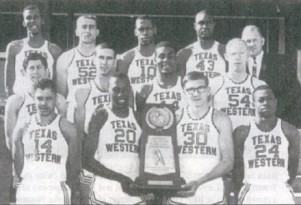| No. 1: Tearing Down the Walls
As hard as it was to narrow the list of important moments in Texas sports history down to ten, picking the top moment was fairly simple. Texas Western's 72-65 win over Kentucky in the 1966 NCAA title game was the obvious choice. Its impact went far beyond the borders of Texas.
In terms of inspiration, it is on par with the 1980's "Miracle on Ice." In terms of social significance, it belongs in the same category as Jackie Robinson's first season.
Unless you are in the small minority of people who have never heard about the game or seen the movie "Glory Road," you already know the story: Texas Western, starting five black players, knocked off perennial powerhouse Kentucky, who started five white players.
Black players were nothing new to basketball. Cincinnati had won a title four years earlier with a roster that had several black players, including Oscar Robertson. Wilt Chamberlin and Bill Russell were dominating the NBA. But this was different. In fact, until Texas Western coach Don Haskins did it earlier that season, no major college team had ever started five blacks in any game.
 |
|
The 1966 Texas Western Miners |
Despite court rulings and civil rights legislation to the contrary, de facto segregation was still in full force and in effect throughout the South in 1966. The Southeastern Conference, of which Kentucky was a member, had yet to see its first black athlete.
The media, most of whom had never seen the Miners play, were fanning the flames. One national reporter wrote, "The Miners, who don't worry much about defense but try to pour the ball through the hoop as much as possible, will present quite a challenge to Kentucky. The running, gunning Texas quintet can do more things with a basketball than a monkey on a 50-foot jungle wire."
In reality, Texas Western was the more disciplined, defensive minded team. The Miners held their opponents to an average of under 62 points a game. It was Kentucky who liked to run the floor. In a 2003 interview with ESPN, Miner guard Willie Worsley said, "We were more white-oriented than any of the other teams in the Final Four. We played the most intelligent, the most boring, the most disciplined game of them all."
As a result, most of the nation was shocked when Texas Western overpowered the Wildcats on the boards and stifled them with its swarming defense. Don't let the seven-point margin of victory fool you — the Miners dominated this game.
The outcome produced an immediate effect. The following year every conference in the South, including the SEC, had integrated basketball teams. Black players, who before were relegated to playing at small black colleges, were suddenly welcomed at major universities across the country.
Gary Williams, the head coach at Maryland, was a sophomore point guard for the Terps at the time. In a 2006 interview with Michael Wilbon of the Washington Post, Williams talks about how he snuck into Cole Field House on the Maryland campus to watch the game.
"I think back on how even the people who taught the game thought that black players weren't smart enough to play the game well," Williams said. "Every coach I had when I was young would say, 'Now listen, you're playing against a black player tonight. You've got to pump-fake him because he'll automatically jump in the air and foul you.' But that night, watching the way Texas Western played, if you had stereotypes in your head about basketball and you were in Cole, it changed the way you thought, changed the way you felt. It's very seldom that one event, that something which took less than two hours, could affect people so dramatically."
Williams is not alone in this sentiment. Most people who witnessed this game voice the same opinion. It had a profound effect on how they viewed black players in particular, and the black race in general.
That is why this game stands out as the most important moment in Texas sports history. That night, on college basketball's biggest stage, a group of young men from an obscure college in El Paso won a lot more than a national championship. They won the goodwill and respect of a large segment of our country. They proved that equality on the hardwood can pave the way for equality in society.
And for that reason, the 1965-66 Texas Western Miners are the embodiment of all that is good and right with athletic competition.
|